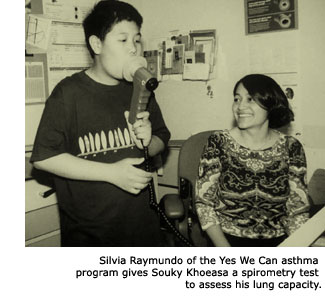 
Breathing Easier Asthma is the top cause of missed school days in California. Yet "the national statistics for quality of care for inner city kids is abysmal," says Mary Beth Love, principal investigator for the Yes We Can Urban Asthma Partnership and professor and chair of SFSU's Health Education Department. "Ninety-five percent of the trouble should never happen." Yes We Can set out to patch some big holes in the safety net that treats underserved children's asthma. Consider that less than 10 percent of inner city children are on the right medications to treat their asthma, she says, and most communities lack any kind of follow-up system to keep children from coming back to emergency rooms. With $941,000 in funding from The California Endowment to demonstrate how the asthma care system could be fixed, this SFSU/ City College of San Francisco partnership worked with more than 20 organizations to develop a medical-social approach. Home visits by health workers, culturally sensitive education and
tight coordination of the care team are some crucial components. The program is now in use at three demonstration sites: San Francisco General Hospital, Mission Neighborhood Health Center and Excelsior Clinic. In Yes We Can's first sample group of 60 children, ER visits dropped from 63 percent of children to 31 percent, and overnight stays in the hospital went from 21 percent to 3 percent. Where less than half the children once used their controller medications, now a full 83 percent are using them. To make it easier for other communities to achieve similar results, Yes We Can created tool kits, complete with how-to manuals, sample protocols and forms, and a CD-ROM database. Yes We Can began distributing the kits to California's community-based and public health clinics this spring. -- Ellen Griffin  
|